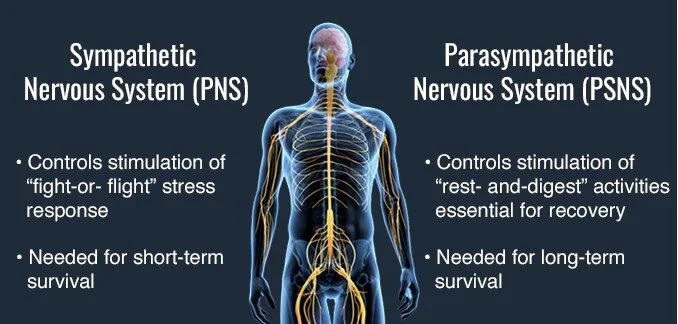Stress - a healthy necessity
Stress is a vital part of living. It is evolutionary essential for survival. In simpler times when faced with a flesh eating predator, our stress response allowed us to react in ways to ensure our survival. Such dangers to our survival exist now, just the form in which they take is different.
A frightening experience and internally created stress is for your body effectively the same. Whether it is overload at work, perhaps a friend or colleague who is particularly irritating, illness, or for many not so fortunate, war and conflict.
Stress is a change in balance of two components of the autonomic nervous system. One part is called Sympathetic, the other Parasympathetic. These two regulate the entire background functioning of your body. When sympathetic activity is high, you are in the so called ‘fight or flight’ (stress) mode, reflected by increased heart rate and breathing, the shunting of blood to the muscles ready for action, the turning down of blood supply to the digestive and reproductive organs, and the opening of the pupils to allow for better vision. You tend to sweat more, and your immune system is turned down. Even the muscles in your ear change so that you are more attuned to deeper and higher frequencies, aligned with noises most dangerous animals make. Parasympathetic activity is characterised by essentially the opposite, and is what we find primarily during sleep, when your body is in repair and regeneration mode.
The term autonomic essentially means automatic, in that the system runs in the background, and is not something we can consciously alter. However, humans do have the means to think at high levels, which can trick our brain into ‘thinking’ that the environment is potentially dangerous, and results in the same stress response. A simple example could be fear of dark rooms. Simply entering one, although it may be perfectly safe, could result in a person reacting in fear, anticipation, or expectation of danger, and resulting in an almost immediate fight or flight reaction. When someone is constantly self-generating a state of stress, they will often experience digestive problems, sleep & sexual dysfunction, & a weakened immune system with frequent illness. This is why a chiropractic care plan with us involves activities to help boost the parasympathetic nervous system
THE ANATOMY OF STRESS
When you react with thoughts to an event, these thoughts stimulate a hormonal reaction, which create an emotional feeling in your body, which feeds back to reinforce the way in which you are thinking. Your thoughts stimulate nerve cells in your brain to create new connections with other nerve cells, much like a hand-shake, which is the physical means in which your thoughts and emotions about an event become stored in your brain as memories. The more you are exposed to this event, and react in the same way, the stronger the memory becomes to this event with more neural connections.
STRESS IS YOUR DECISION
Some common things said about stress are; ‘he stresses me out’, ‘work is so stressful’, ‘I hate it when…’, ‘I’m scared of…’ The important realisation is that you are responsible for how you think in relation to the event that you are faced with. You can chose to think of the event as being stressful, however you can also chose to recognise what is happening as a good learning experience, or perhaps that what is happening is outside of your control, so there is no need to react to it, and to just keep calm.
No one else can make you think anything. How you think, and what you think is entirely up to you. This means, although not necessarily easy, that you are entirely responsible for whether someone, or something is stressful for you.
LET’S REWIRE YOUR BRAIN
There are a few key steps that need to be repeated in order to change your level of stress. The first is to identify what or who is the primary trigger for causing you to react. This needs to be as specific as possible. Is it what someone says, what they do, a specific volume or type of work, or maybe the behaviour of a loved one living (or dead)?
Appreciating why and how you react is important. You need to turn your reaction around by planning a new response for when you are next faced with this event, person, or perhaps bad memory of something or someone. You will need to practice this in your head. You also need to be faced with the challenge multiple times to allow your brain and emotional reactions to re-wire. The more you work on recognising the key irritant, planning for and implementing a specific, pre-planned new reaction, the quicker you will bring your perceived stress levels down to a healthy level. Oddly it´s also important to allow yourself to react, but to recognise you reaction for what it is and act differently to the patterns of old.
Anatomically you are essentially rewiring your brain. Other nerve cells will form connections to reflect your new thinking, and the old nerve cell handshakes, like the separation of old enemies, will let go and those memories and reactions will fade.
THE BIG PICTURE
It is seldom that someone is intentionally doing something to explicitly irritate you. However we tend to assume the opposite. Try not to think like this, some people just don’t realise that their actions or words are causing you to react. Sometimes informing them of your problem may simplify your efforts to improving your reaction to them. Most of what we worry about in this world is not important. A lot of it we have no control over anyway and only a very small portion can we control and make a difference to. Appreciating this will also make your life much easier and fulfilling.
How chiropractic can help
New discoveries in chiropractic are showing how a forward head posture contributes to a physiological shift into stress in the body. Regular adjustments help bring that back into balance, typically along with improvement in posture. What we additionally recommend is then a daily routine of simple exercise to ensure that the parasympathetic is adequately stimulated.



